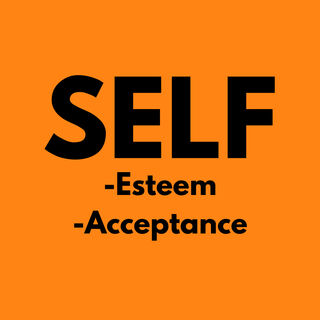Self-Esteem
Poor Self-Esteem? Try Self-Acceptance
Having low self-esteem doesn't mean one can't lead a fulfilling life.
Posted July 21, 2022 Reviewed by Michelle Quirk
Key points
- Moving away from high versus low self-esteem and toward self-acceptance can benefit your well-being.
- The self-assuredness that often comes with high self-esteem can get in the way of curiosity and openness to others' views.
- Self-acceptance is analogous to body neutrality—accepting your body, perceived flaws and all, and appreciating all that it does for you.

The media and even science imply that healthy self-esteem is vital for our mental health. So, what do we do when we think we're "meh" or not so great? Can we still live a fulfilling, contented life?
As a professional mental health therapist for 15 years now and a 51-year-old human being, I unequivocally believe yes. I’d take self-acceptance over self-esteem any day.
Self-Esteem
Trimming out nuanced definitions, self-esteem is basically one’s opinion of oneself. The American Psychological Association’s Dictionary of Psychology says it’s “the degree to which the qualities and characteristics contained in one’s self-concept are perceived to be positive....The more positive the cumulative perception of these qualities and characteristics, the higher one’s self-esteem.” Healthy and high self-esteem seem the desired statuses to attain.
Yet healthy self-esteem (let alone high or low) seems like a counterproductive rating to me. It’s scaling self-worth like a pass-or-fail test. Certainly, grading our levels of self-esteem may be thoughtful and insightful, but it can also leave us feeling worse about ourselves. It can cause us to think something similar to this: “Since I don’t like parts of me, I don’t have high self-esteem.” Then, “Since I didn’t reach that high status, I'm doomed." After all, various research links poor self-esteem to mental health issues such as depression, suicidal ideation, eating disorders, and other problems.
High self-esteem can come off as confusing, which is also troublesome. Outwardly admitting to or portraying having high self-esteem can seem
- Performative, like someone showing us they are OK and didn’t fail the test;
- Disconnected from reality, similar to when someone says they are an excellent singer and then they can't match a pitch; or
- Even slightly (or majorly) narcissistic, a clinical and mainstream term that often pairs with an inflated view of self and entitled grandiosity.
Some who yearn to improve or stabilize their self-esteem will find a metaphorical self-concept gym where they can work out to strengthen their me-muscles. Many exercises are available online and in books: See research, check related nonprofits, or do an Internet search. A 2021 meta-analysis points out the plethora of interventions (e.g., cognitive-behavioral therapy, support groups, positive psychology approaches) that have been devised to increase self-esteem; some have demonstrated effectiveness. However, similar to the quick results we get from crash diets, a crash course approach to anything typically produces unsustainable, unreliable results long-term.
Self-Acceptance
Though self-acceptance is not a popularized term like self-esteem, I hope that someday it will be. To me, self-acceptance means the following:
- Greeting all the different parts of you with bravery and compassion.
- Contrary to popular belief, self-acceptance does not mean to stop growing.
- Knowing yourself + self-compassion + reality = self-acceptance.
Years ago, I started striving for self-acceptance over high self-esteem partly because I got tired of people expressing bewilderment that I didn't have better self-esteem than I did. That felt bad on top of an already uneasy view of self.
Seriously, so what if I don't think I'm the bee's knees? I’m pretty happy and satisfied in life. Besides, the self-assuredness that often comes with high self-esteem can get in the way of curiosity and openness to others' views.
Partly due to self-acceptance, I know who I am, what my values are, and what my moral boundaries are. But I don’t need to be “right,” and I’m not threatened by others' different ideas, beliefs, etc. I’ve met and accepted my many parts that correspond to lower and higher levels of self-esteem. All of these parts combined make a whole. So, I guess if I had to rank it, I might have “highly flexible” self-esteem and “steady, strong self-acceptance.”
When discussing the differences between self-esteem and acceptance with Dr. Charlotte Markey—my colleague, professor at Rutgers, body image researcher, and multiply published author—she said, "Self-esteem is feeling good about yourself, whereas self-acceptance is being at peace with yourself. The terms seem analogous to body positivity versus body neutrality." And I agree!
For those who aren’t familiar, in pop culture, the term “body positivity” has come to mean “loving your body—the shape, size, and just about everything about its physical state. Body neutrality is more of a space of accepting your body, perceived flaws and all, at any size, and appreciating all that it does for you. In body neutrality, "loving" your shape or size is not required, and in body positivity, it seems requisite. If you question our interpretations, look at social media and other sources where people consume information. I suspect you’ll see what we mean.

Bottom Line
High self-esteem is powerful and wonderful for any who genuinely has it. For the rest of us, self-acceptance may be the key to living contented lives. When we're striving to know, grow, and accept ourselves, there's space for feeling good about ourselves in the moment. Those moments of feeling purposeful, joyful, connected, appreciated, or whatever—each can happen sans positive self-esteem. Moments add up, helping us experience more contentedness and fulfillment.
I don’t know about you, but I’m “in” for more good-feels for anyone but especially for someone who thinks they don’t have healthy or high self-esteem.
This blog is provided for informational purposes and is not a substitute for professional advice or therapy.
References
American Psychological Association. (2022). APA Dictionary of Psychology. https://dictionary.apa.org/self-esteem
Colmsee, I.-S. O., Hank, P., & Bošnjak, M. (2021). Low self-esteem as a risk factor for eating disorders: A meta-analysis. Zeitschrift für Psychologie, 229(1), 48–69. https://doi.org/10.1027/2151-2604/a000433
Nguyen, D. T., Wright E. P., Dedding C., Pham, T. T., & Bunders J. (2019) Low self-esteem and its association with anxiety, depression, and suicidal ideation in Vietnamese secondary school students: A cross-sectional study. Frontiers in Psychiatry, 10. doi.10.3389/fpsyt.2019.00698
Niveau, N., Boris New, B., & Beaudoin, M. (2021). Self-esteem interventions in adults – A systematic review and meta-analysis. Journal of Research in Personality, 94, https://doi.org/10.1016/j.jrp.2021.104131.
Sowislo, J. & Orth, U. (2013). Does low self-esteem predict depression and anxiety? A meta-analysis of longitudinal studies. Psychological Bulletin, 139, 213-240. doi: 10.1037/a0028931




